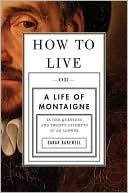More on this book
Community
Kindle Notes & Highlights
Started reading
March 11, 2025
Death is only a few bad moments at the end of life, he wrote in one of his last added notes; it is not worth wasting any anxiety over.
It taught them not to think about death except when they were dying, and very little even then.
“Let us cut loose from all the ties that bind us to others; let us win from ourselves the power to live really alone and to live that way at our ease.”
If others examined themselves attentively, as I do, they would find themselves, as I do, full of inanity and nonsense. Get rid of it I cannot without getting rid of myself. We are all steeped in it, one as much as another; but those who are aware of it are a little better off—though I don’t know.
Montaigne also loved the strong sense of Plutarch’s own personality that comes across in his work: “I think I know him even into his soul.”
Tyranny creates a drama of submission and domination, rather like the tense battle confrontation scenes often described by Montaigne. The populace willingly gives itself up, and this only encourages the tyrant to take away everything they have—even their lives,
La Boétie was dying the perfect Stoic death, full of courage and rational wisdom. Montaigne was expected to do his part: to help his friend to maintain this courage, and then to act as witness, recording the details so others could learn from the story.
Stoics and Epicureans shared a great deal of their theory, too. They thought that the ability to enjoy life is thwarted by two big weaknesses: lack of control over emotions, and a tendency to pay too little attention to the present.
Montaigne used the trick of diversion against his own fear of getting old and dying. The years were dragging him towards death; he could not help that, but he need not look at it head-on. Instead, he faced the other way, and calmed himself by looking back with pleasure over his youth and childhood. Thus, he said, he managed to “gently sidestep and avert my gaze from this stormy and cloudy sky that I have in front of me.”
How puny is the knowledge of even the most curious person, he reflected, and how astounding the world by comparison.
This seemingly casual remark proposes a shocking idea: that we may be cut off by our very nature from seeing things as they are.
I accept with all my heart and with gratitude what nature has done for me, and I am pleased with myself and proud of myself that I do. We wrong that great and all-powerful Giver by refusing his gift, nullifying it, and disfiguring it.
It is an absolute perfection and virtually divine to know how to enjoy our being rightfully. We seek other conditions because we do not understand the use of our own, and go outside of ourselves because we do not know what it is like inside. Yet there is no use our mounting on stilts, for on stilts we must still walk on our own legs. And on the loftiest throne in the world we are still sitting only on our own rump.
Against my will I have witnessed the most terrible defeat of reason and the wildest triumph of brutality in the chronicle of the ages.
“We are all patchwork,” he wrote, “and so shapeless and diverse in composition that each bit, each moment, plays its own game.” No overall point of view existed from which he could look back and construct the one consistent Montaigne that he would have liked to be.
The twenty-first century has everything to gain from a Montaignean sense of life, and, in its most troubled moments so far, it has been sorely in need of a Montaignean politics. It could use his sense of moderation, his love of sociability and courtesy, his suspension of judgment, and his subtle understanding of the psychological mechanisms involved in confrontation and conflict. It needs his conviction that no vision of heaven, no imagined Apocalypse, and no perfectionist fantasy can ever outweigh the tiniest of selves in the real world. It is unthinkable to Montaigne that one could ever
...more


